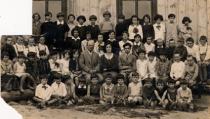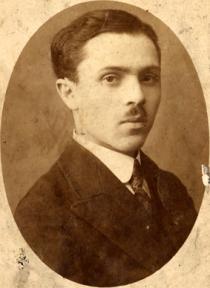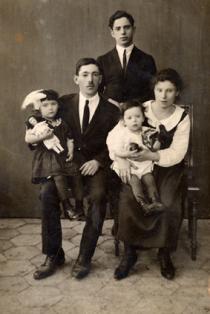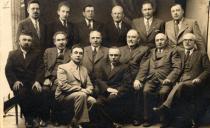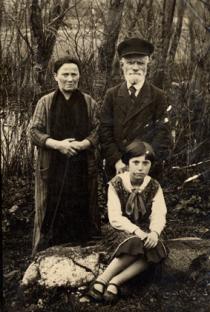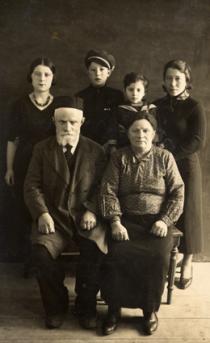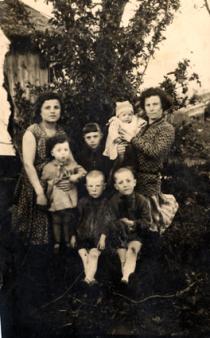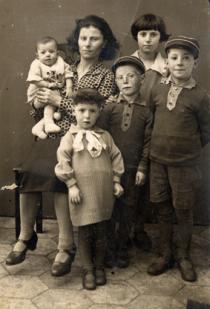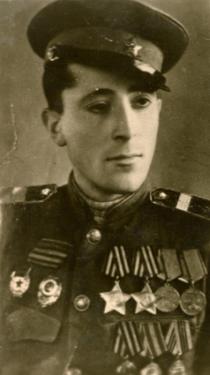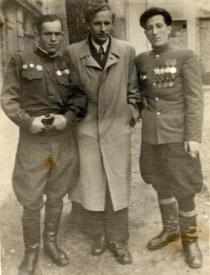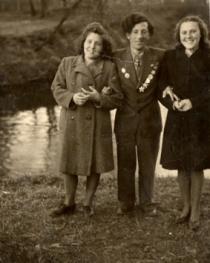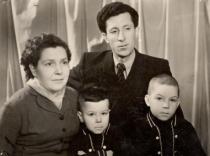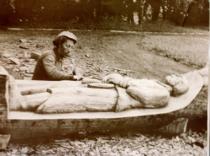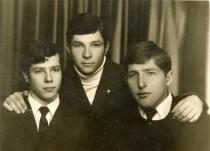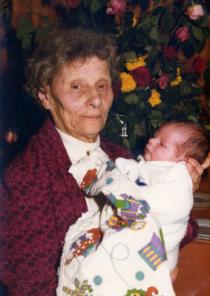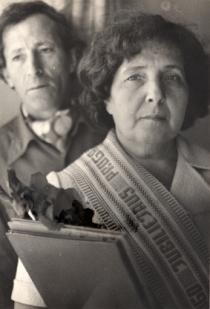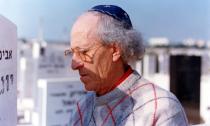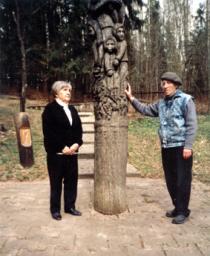This is I during my army service in Germany, after the war ended in late 1945. I sent this photo to mom who came back in Plunge from evacuation. She was very proud of me and showed the picture to everybody she knew.
In December 1941 16 Lithuanian division was founded and all citizens of Lithuania, who reached draftee age, were sent in the lines. Father and I got notifications and on 22 February 1942 we were in the lines. We were sent in Balakhna, where division was being formed. We were on trainings in Balakhna for a year. I became a gunman and my father a marksman.
We were in the lines in February 1943 and were in one of the fiercest fronts -Kursk vicinity. Father served in 156 rifle battalion and I was in the same battalion, though in gun division. The battle in the vicinity of Alexeyevka began on 23 February 1943. It was a fierce battle.Germans were shooting everywhere. I hit behind the body of the dead soldier, but I was hit with blasted mine. On 1 March 1943 I was severely wounded. I was sent in the hospital.
I was sent in Kazan hospital. They removed a bullet. One of my nerves was caught and my hand was immovable. Having serious injury I was sent in the rear to Zlatoust. Then I was sent to rehabilitation center in Chelaybinsk for 20 days. After that I had to go to the front once again.
Representatives of Cossacks corps under general Dovater command came in Chelyabinsk to replenish their troops from the rehabilitation center. I was offered to join them. They assigned me in horsed reconnaissance. I turned out to be in the First Byelorussian Front. It was the end of 1943 and Soviet army was retreating. I started from Gomel and crossed Poland, Germany. I even met Americans on Elba.
On 9 May during our respite we heard the signal of alarm. After greeting my commander made a short pause and said: "brothers, the war is over!" Even now I am crying when I go back to this moment. We were rejoicing and crying at a time as I remembered about my brother Abram, who perished almost at the end of war during the capture of Konigsberg, my old grandparents, sister and other relatives who perished during the occupation.
I served honestly. My military deeds were highly appreciated. I have numerous awards- two Grain Patriotic War Orders, Red Banner Order, medals for liberation of Warsaw and other cities, medal for capture of Berlin etc. I have the letter of gratitude from Stalin for capture of German town Oltsin.
The war is over, but I still had to serve in occupied troops. I was sent to the North of Germany in a small town on the border with Sweden, on Baltic Sea. I do not remember the name of that town. I finished war in the rank of senior sergeant and was assigned the commandant of that small town irrespective of my low rank. The work was not cumbersome. My duty was to keep the order in the city, though there was an apple-pie order there anyway. After war Germans were frightened as they felt guilty. Thus, there were hardly any incidents. There was a peaceful, but very poor living. People got back to normal, started rebuilding the destroyed. I had a luxurious living. I lived with the German who was married to a Lithuanian. He had a good game preserve and a house, where we were living. It was intelligentsia, who had nothing to do with the atrocity of the fascists. We spent evenings together. I told the hosts about my military life, about crimes of Hitler' s troops. They were shocked. In April 1947 I was demobilized from army and went to motherland, Plunge.

